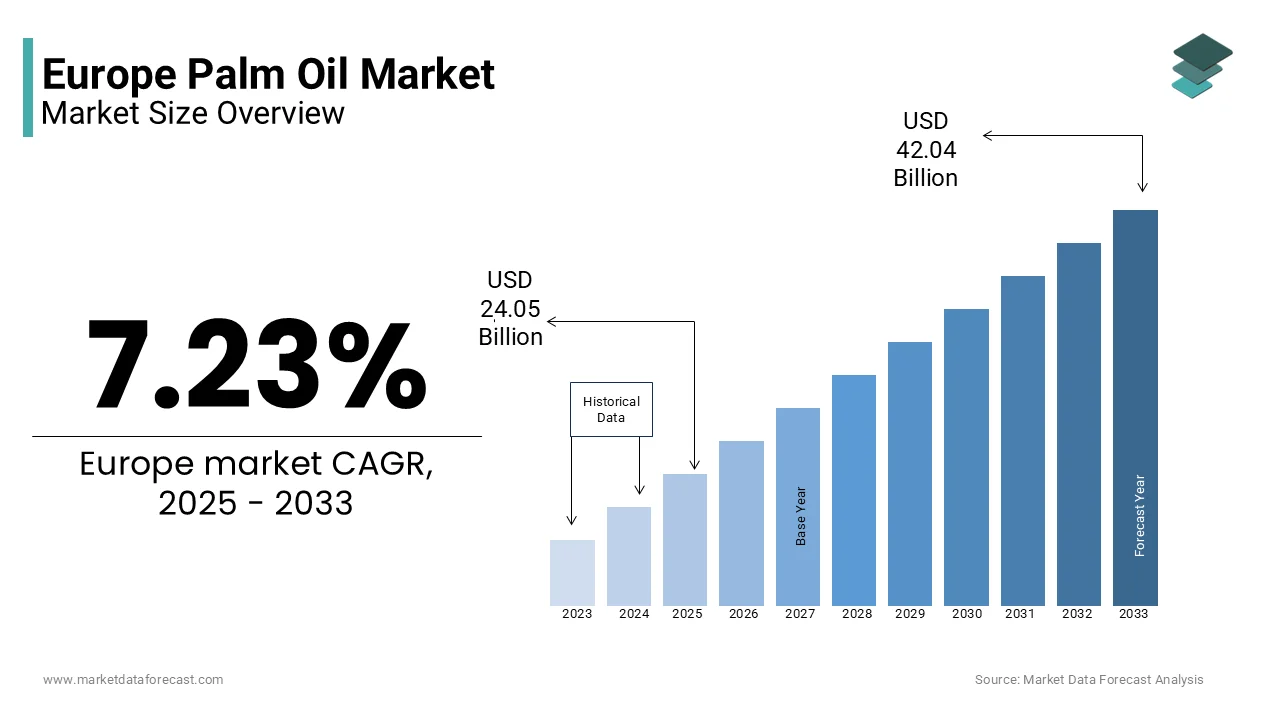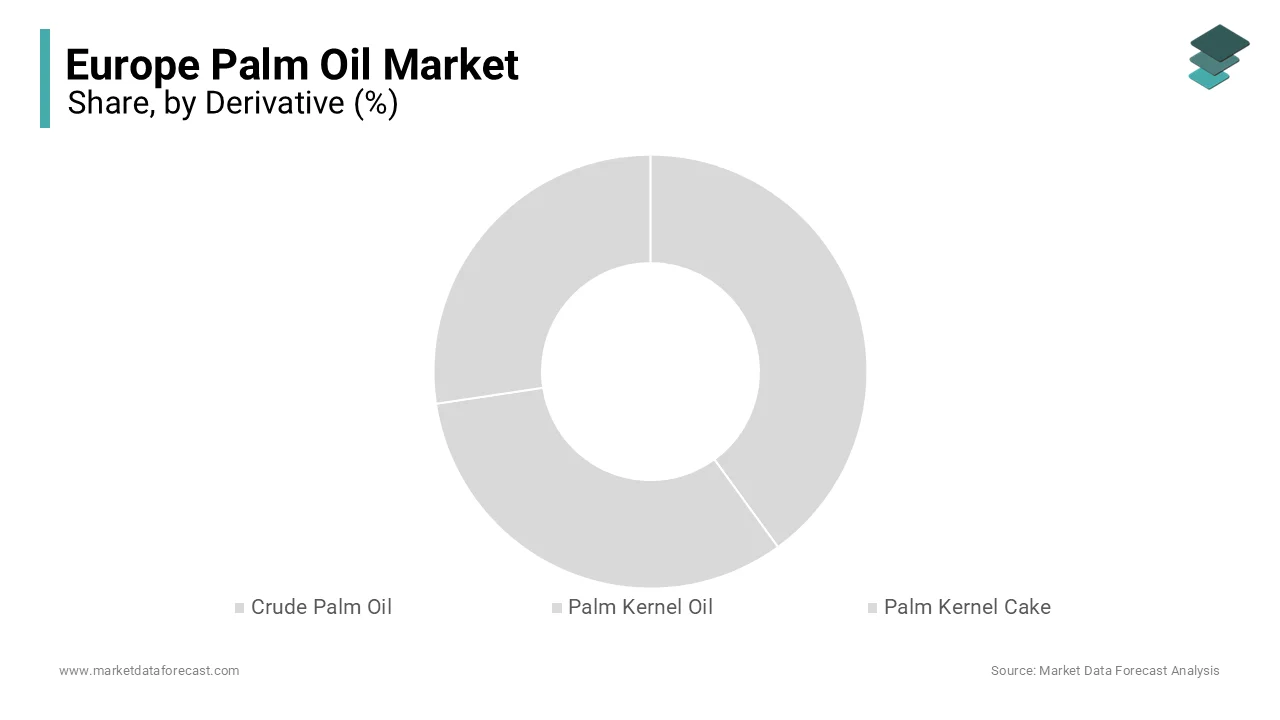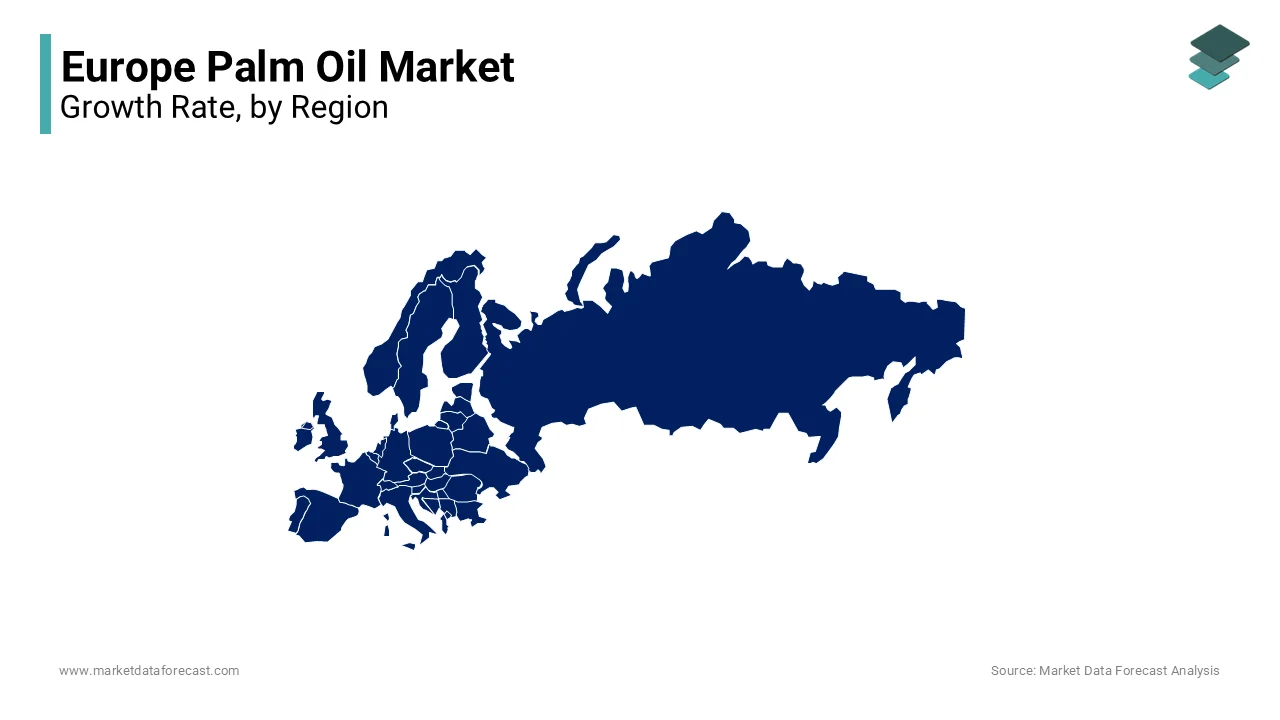Europe Palm Oil Market Size, Share, Trends & Growth Forecast Report By Derivative, Application, and Country (UK, France, Spain, Germany, Italy, Russia, Sweden, Denmark, Switzerland, Netherlands, Turkey, Czech Republic & Rest of Europe), Industry Analysis From 2025 to 2033
Europe Palm Oil Market Size
The Europe palm oil market size was valued at USD 22.43 billion in 2024, and the market size is expected to reach USD 42.04 billion by 2033 from USD 24.05 billion in 2025. The market's is promising CAGR for the predicted period is 7.23%.

Palm oil is a versatile and economically important vegetable oil used as a raw material in both food and non-food items. It is used in shops all over the world and can be found in candies, cakes, margarine, cereals, detergents, and cosmetics. Palm oil is also employed in the production of first-generation biofuels. It's also used to treat malaria, high blood pressure, cholesterol, and cyanide poisoning, as well as to prevent vitamin A deficiency, cancer, brain disease, and aging. Because trees require warm temperatures, sunlight, and plenty of rain to enhance agricultural production, the majority of this oil is produced in Asia, Africa, and South America. Palm oil is a common ingredient in margarine, biscuits, instant noodles, bread, lipsticks, cereals, chocolates, sweets, ice cream, shampoos, and detergents, among other things. Palm oil has a low trans-fat content and is profitable due to increased global demand, which further increases the Europe market share. A technological breakthrough combined with substantial foreign investment in the field of sustainable production methods is expected to generate numerous opportunities for participants from around the world. A higher manufacturing price as a result of the adoption of sustainable production procedures is thought to be an important stumbling block for new market participants. In recent years, many government programs involving the blending of conventional and bio-based fuels, as well as the increased use of goods like bio-based diesel, have garnered widespread recognition.
Consumers all across the world are aware of organic cosmetics, lubricants, and surfactants, which has boosted the European palm Oil market growth. Several government programs, such the RSPO, POIG, and others, have a favorable impact on the Europe palm oil market industry. Several multinationals in this industry are constantly investing in their R&D departments to improve their product portfolio, allowing them to respond to a wider range of applications and supporting the European palm Oil market size. Technological innovation, combined with significant foreign investment in the field of sustainable production methods, should open up a plethora of prospects for industry participants all over the world. Growing demand for vegetable oil as a feedstock for biodiesel production, as well as improving economic conditions, rising living standards, and changing food patterns in emerging countries, are the factors that primarily act as Europe. Its smooth and creamy texture, as well as the fact that it has no odor, make it an ideal ingredient for many recipes, such as those used in the bakery (especially for biscuits), have contributed to a spike in the expansion of this industry. It has a natural perspective effect that helps food last longer by fighting oxidation, which degrades it. The rigorous environmental rules that control production, on the other hand, should stifle expansion in the European palm Oil market despite a number of positive characteristics. A higher production cost as a result of the adoption of sustainable manufacturing methods is thought to be another market restraint that should deter new entrants. The palm oil market is defined by stringent government restrictions that force enterprises to adhere to production and extraction sustainability. Consumer preferences for fuels and carbon sources are shifting, resulting in the growing demand for biodiesel applications.
REPORT COVERAGE
|
REPORT METRIC |
DETAILS |
|
Market Size Available |
2024 to 2033 |
|
Base Year |
2024 |
|
Forecast Period |
2025 to 2033 |
|
CAGR |
7.23% |
|
Segments Covered |
By Derivative, Application, and Region |
|
Various Analyses Covered |
Global, Regional, & Country Level Analysis; Segment-Level Analysis; DROC; PESTLE Analysis; Porter’s Five Forces Analysis; Competitive Landscape; Analyst Overview of Investment Opportunities |
|
Regions Covered |
UK, France, Spain, Germany, Italy, Russia, Sweden, Denmark, Switzerland, Netherlands, Turkey, Czech Republic, Rest of Europe |
|
Market Leaders Profiled |
olden Agri Resources Limited, Godrej Agrovet Limited, PT Astra Agro Lestari Tbk, Cargill Inc, United Palm Oil Industry Public Company Limited, Wilmar International Limited, Sime Darby, IOI Corp, London Sumatra, Kulim Bhd., and others. |
SEGMENTAL ANALYSIS
By Derivative Insights
Based on derivatives, crude palm oil (CPO) became the most dominant segment of the palm oil market, accounting for 58.3 percent of total sales, followed by palm kernel oil (PKO) (PKO). Over the projected period, rising demand for oleochemicals in the production of agrochemicals and cleaning products is likely to drive Europe's Palm Oil market volume.

On the other hand, Palm Kernel Oil was one of the most important segments, accounting for 23.0 percent of total market sales. Because of its advantageous features, such as an 80 percent saturated fat content and a high level of medium-chain fatty acids (capric, lauric acids, and caprylic acids), the segment is predicted to grow. Furthermore, its sole usage as a feedstock for animal feed and biomass is expected to improve product sales over the projection period.
By Application Insights
Based on the Application, the biofuel and energy end-use segment accounted for a considerable revenue share of 15.1%, and it is predicted to increase at a profitable rate during the projection year. This is expected to occur as a result of increased demand for biofuels across all geographies. In recent years, biodiesel has grown in favor among consumers as a viable alternative to diesel. In terms of feedstock, palm oil is promoted as a traditional biodiesel feedstock and is seen as a more cost-effective option for soybeans.
REGIONAL ANALYSIS
The palm oil sector in the world is set to be dominated by Europe. Sustainable palm oil is imported and distributed throughout Europe by countries such as the Netherlands, Germany, Spain, and Italy. Fact. According to MR, the region will grow at a CAGR of roughly 4% until 2031. According to sources, the European Union imported 7.3 million tonnes for use in the food and energy industries. These factors are projected to help the growth of the global sustainable palm oil market.

Consumers' high incomes and the expanding impact of social media have fueled demand for high-end cosmetics and personal care across Europe. Hair and beard care products are among the products that men are quickly adjusting to new trends in the consumer cosmetics market. As a result of these changes, cosmetic businesses have been driven to design specific products with distinct characteristics directed towards this group.
KEY MARKET PLAYERS
Key players in the European palm Oil Market are Golden Agri Resources Limited, Godrej Agrovet Limited, PT Astra Agro Lestari Tbk, Cargill Inc, United Palm Oil Industry Public Company Limited, Wilmar International Limited, Sime Darby, IOI Corp, London Sumatra, and Kulim Bhd.
RECENT HAPPENINGS IN THE MARKET
Cargill invested $200 million in a new palm oil refinery in Lampung, Indonesia, which will help the company construct a sustainable palm supply chain and provide consumers with verified deforestation-free goods. Through a completely integrated supply chain from plantation to consumer, the new refinery will play a significant role in connecting sustainable crude palm oil production in Indonesia to demands in North America and Europe.
MARKET SEGMENTATION
This Research Report on Europe Palm Oil Market is segmented and sub-segmented into the following categories:
By Derivative
- Crude Palm Oil
- Palm Kernel Oil
- Palm Kernel Cake
By Application
- Edible Oil
- Cosmetics
- Bio-diesel
- Lubricants
- Surfactants
By Country
- UK
- France
- Spain
- Germany
- Italy
- Russia
- Sweden
- Denmark
- Switzerland
- Netherlands
- Turkey
- Czech Republic
- Rest of Europe
Frequently Asked Questions
1. How is Palm Oil Used in Europe?
Palm oil is a versatile ingredient in Europe, used in various food products such as baked goods, margarine, chocolate, and instant noodles. It is also found in cosmetics, detergents, and biofuels.
2. What Are the Environmental Concerns Associated with Palm Oil?
The expansion of palm oil plantations has been linked to deforestation, biodiversity loss, and habitat destruction, particularly in tropical regions. Sustainable palm oil initiatives seek to address these concerns.
3. What Efforts are Being Made to Address Sustainability in the Palm Oil Industry?
Various stakeholders, including producers, governments, NGOs, and consumer groups, are working together to promote sustainable palm oil production through certification schemes, conservation initiatives, and advocacy campaigns.
Related Reports
Access the study in MULTIPLE FORMATS
Purchase options starting from $ 2000
Didn’t find what you’re looking for?
TALK TO OUR ANALYST TEAM
Need something within your budget?
NO WORRIES! WE GOT YOU COVERED!
Call us on: +1 888 702 9696 (U.S Toll Free)
Write to us: [email protected]